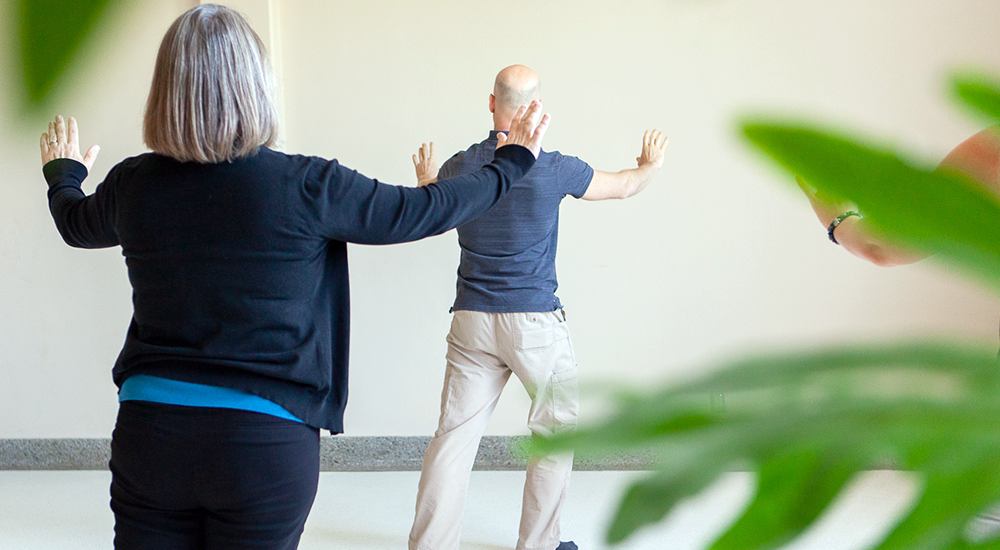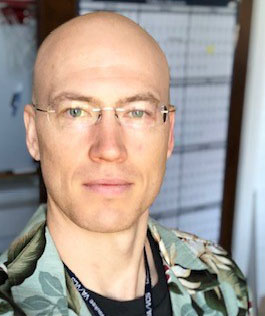As the whole health program manager at VA Roseburg VA Medical Center (VAMC) in Oregon, registered nurse Fletcher Watson believes engaging in complementary and whole health programs is a game changer for Veterans’ well-being.
Since 2014, Watson has been working to expand complementary and whole health programs. These programs support Veterans experiencing chronic health issues. They also help improve mental health and general wellness.
These programs include meditation, yoga, tai chi, mindfulness practice, acupuncture and other complementary therapies. Many of the classes are led by practitioners specially trained to support Veterans’ unique needs.
“The magic that happens with our program is possible because the Veteran directs us as to what he or she is ready for rather than us deciding what they should do,” Watson says. “We lock in on that motivation and get behind them. All of a sudden they are more successful and that success often leads them to want to do more.”
Whole health programs put Veterans at the center of their success
Over the last six years, Watson has seen these programs dramatically improve Veterans’ lives. They help Veterans manage anxiety, post-traumatic stress disorder, weight, diabetes, chronic pain and other chronic health issues.
“Evidence shows that partnering with Veterans through this whole health approach – finding out what matters most to them and meeting them there – leads to more sustained behavior, lasting lifestyle change. The success they experience in a particular area often empowers and encourages them to also transform their lives in other areas as well.”
This was the case for a Veteran who lived with Post-Traumatic Stress Disorder and anxiety. Those issues prevented her from being able to travel by car, train or plane. She isolated herself in her home and had not seen her family in years. Three months after joining the yoga program she was able to visit her family for the first time.
Translates powerfully into everyday life
“For some Veterans, talk-based therapies can generate anxiety. However, therapeutic movement modalities such as yoga encourage Veterans to simply notice what is happening in their experience and gently stay as present as they are able in the supportive environment. This ability to simply notice and stay present gets strengthened and seems to translate powerfully into everyday life for many of our Veterans such as this particular woman Veteran.”

Whole health programs include meditation, yoga, tai chi, mindfulness practice, acupuncture and other complementary therapies.
Here is another example of one of the many Veterans who have changed their lives after participating in one of Watson’s programs.
“Another Veteran who began attending battlefield acupuncture mentioned to me that he had come off his opioids. He had not taken them in over a week. Two weeks went by and he approached me. He was excited to share that he was working with his provider to come off his sleeping medication.
“About a month later he returned with news of more progress. Because he was no longer in so much pain he was able to sleep better. He also no longer needed one of his mood stabilizers. He said he just felt so much better, even happy again. His progress in such a short time was remarkable.”
Facing your fears and addressing personal pain and trauma can be difficult, but Watson guarantees the process is worth it.
Whole health at your VA
In 2014, VHA established the Integrative Health Coordinating Center (IHCC) to identify and address barriers to providing integrated health across the VHA system. IHCC continues to serve as a resource for clinical practices and education for Veterans, clinicians, leadership and staff.
The center is critical in ensuring Veterans receive the same positive outcomes despite each program being run and organized differently from medical center to medical center.
When asked what he would say to Veterans on the fence about joining one of VA’s Whole Health programs, Watson simply asks, “What do you want your health for? Take a leap and give it a try.”
Veterans who are interested in beginning their Whole Health journey can talk to their health team about their needs and priorities. Some of the popular group programs are available online through video sessions Veterans can follow along at home.
Additional resources on specific programs and classes can also be found here.
This blog is part of a VA series recognizing 2020 as the International Year of the Nurse and Midwife. VA salutes the more than 100,000 VA nurses who work tirelessly to serve Veterans in communities across the country. VA nurses are committed to taking care of Veterans. They bring comfort and hope to thousands of patients, 24 hours a day, seven days a week, 365 days a year. We invite you to show your support for these everyday heroes and thank a nurse at your next telehealth or in-person appointment.
Courtesy the VHA Office of Communications.
Topics in this story
More Stories
Veteran Byron Potier weighed almost 300 pounds and was tired and lethargic. He was the perfect candidate for gastric sleeve surgery.
How much do you know about VA care, benefits and services? Don’t miss out on what you've earned—check out the "2025 VA Federal Benefits Guide for Veterans, Dependents, Survivors, and Caregivers" handbook to learn more.
Feeling stressed? Your breath can help you relax and focus. Take 3 minutes to reset and prioritize your well being for this week's #LiveWholeHealth practice.







